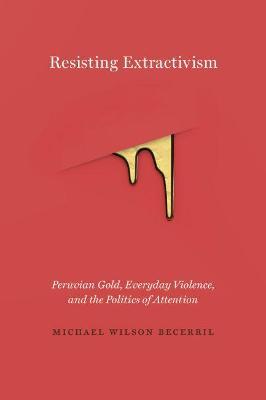Resisting Extractivism: Peruvian Gold, Everyday Violence, and the Politics of Attention

Resisting Extractivism: Peruvian Gold, Everyday Violence, and the Politics of Attention
Peru is classified as one of the deadliest countries in the world for environmental defenders, where activists face many forms of violence. Through an ethnographic and systematic comparison of four gold mining conflicts in Peru, Resisting Extractivism presents a vivid account of subtle and routine forms of violence, analyzing how meaning making practices render certain types of damage and suffering noticeable while occluding others. The book thus builds a ground-up theory of violence--how it is framed, how it impacts people's lived experiences, and how it can be confronted. By excavating how the everyday interactions that underlie conflicts are discursively concealed and highlighted, this study assists in the prevention and transformation of violence over resource extraction in Latin America. The book draws on a controlled, qualitative comparison of four case studies, extensive ethnographic research conducted over fourteen months of fieldwork, analysis of over 900 archives and documents, and unprecedented access to more than 250 semi structured interviews with key actors across industry, the state, civil society, and the media. Michael Wilson Becerril identifies, traces, and compares these dynamics to explain how similar cases can lead to contrasting outcomes--insights that may be usefully applied in other contexts to save lives and build better futures.
Peru is classified as one of the deadliest countries in the world for environmental defenders, where activists face many forms of violence. Through an ethnographic and systematic comparison of four gold mining conflicts in Peru, Resisting Extractivism presents a vivid account of subtle and routine forms of violence, analyzing how meaning making practices render certain types of damage and suffering noticeable while occluding others. The book thus builds a ground-up theory of violence--how it is framed, how it impacts people's lived experiences, and how it can be confronted. By excavating how the everyday interactions that underlie conflicts are discursively concealed and highlighted, this study assists in the prevention and transformation of violence over resource extraction in Latin America. The book draws on a controlled, qualitative comparison of four case studies, extensive ethnographic research conducted over fourteen months of fieldwork, analysis of over 900 archives and documents, and unprecedented access to more than 250 semi structured interviews with key actors across industry, the state,
PRP: 305.49 Lei
Acesta este Pretul Recomandat de Producator. Pretul de vanzare al produsului este afisat mai jos.
274.94Lei
274.94Lei
305.49 LeiIndisponibil
Descrierea produsului
Peru is classified as one of the deadliest countries in the world for environmental defenders, where activists face many forms of violence. Through an ethnographic and systematic comparison of four gold mining conflicts in Peru, Resisting Extractivism presents a vivid account of subtle and routine forms of violence, analyzing how meaning making practices render certain types of damage and suffering noticeable while occluding others. The book thus builds a ground-up theory of violence--how it is framed, how it impacts people's lived experiences, and how it can be confronted. By excavating how the everyday interactions that underlie conflicts are discursively concealed and highlighted, this study assists in the prevention and transformation of violence over resource extraction in Latin America. The book draws on a controlled, qualitative comparison of four case studies, extensive ethnographic research conducted over fourteen months of fieldwork, analysis of over 900 archives and documents, and unprecedented access to more than 250 semi structured interviews with key actors across industry, the state, civil society, and the media. Michael Wilson Becerril identifies, traces, and compares these dynamics to explain how similar cases can lead to contrasting outcomes--insights that may be usefully applied in other contexts to save lives and build better futures.
Peru is classified as one of the deadliest countries in the world for environmental defenders, where activists face many forms of violence. Through an ethnographic and systematic comparison of four gold mining conflicts in Peru, Resisting Extractivism presents a vivid account of subtle and routine forms of violence, analyzing how meaning making practices render certain types of damage and suffering noticeable while occluding others. The book thus builds a ground-up theory of violence--how it is framed, how it impacts people's lived experiences, and how it can be confronted. By excavating how the everyday interactions that underlie conflicts are discursively concealed and highlighted, this study assists in the prevention and transformation of violence over resource extraction in Latin America. The book draws on a controlled, qualitative comparison of four case studies, extensive ethnographic research conducted over fourteen months of fieldwork, analysis of over 900 archives and documents, and unprecedented access to more than 250 semi structured interviews with key actors across industry, the state,
Detaliile produsului








